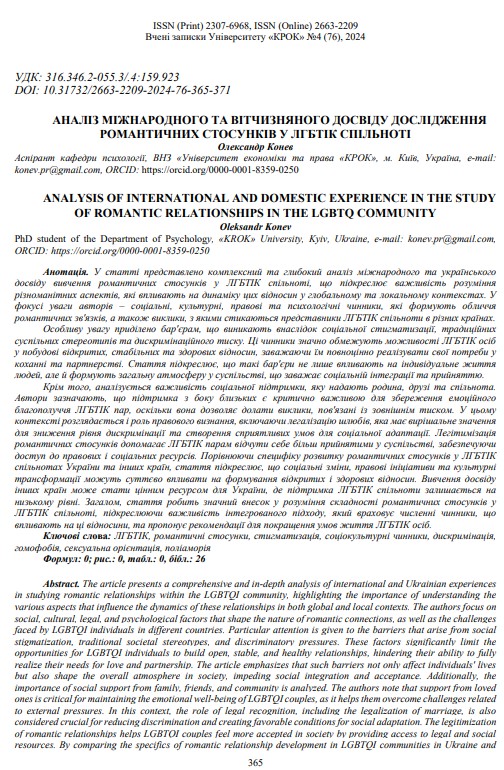ANALYSIS OF INTERNATIONAL AND DOMESTIC EXPERIENCE IN THE STUDY OF ROMANTIC RELATIONSHIPS IN THE LGBTQ COMMUNITY
DOI:
https://doi.org/10.31732/2663-2209-2024-76-365-371Keywords:
LGBTQ, romantic relationships, stigmatization, sociocultural factors, discrimination, homophobia, sexual orientation, polyamoryAbstract
Abstract. The article presents a comprehensive and in-depth analysis of international and Ukrainian experiences in studying romantic relationships within the LGBTQI community, highlighting the importance of understanding the various aspects that influence the dynamics of these relationships in both global and local contexts. The authors focus on social, cultural, legal, and psychological factors that shape the nature of romantic connections, as well as the challenges faced by LGBTQI individuals in different countries. Particular attention is given to the barriers that arise from social stigmatization, traditional societal stereotypes, and discriminatory pressures. These factors significantly limit the opportunities for LGBTQI individuals to build open, stable, and healthy relationships, hindering their ability to fully realize their needs for love and partnership. The article emphasizes that such barriers not only affect individuals' lives but also shape the overall atmosphere in society, impeding social integration and acceptance. Additionally, the importance of social support from family, friends, and community is analyzed. The authors note that support from loved ones is critical for maintaining the emotional well-being of LGBTQI couples, as it helps them overcome challenges related to external pressures. In this context, the role of legal recognition, including the legalization of marriage, is also considered crucial for reducing discrimination and creating favorable conditions for social adaptation. The legitimization of romantic relationships helps LGBTQI couples feel more accepted in society by providing access to legal and social resources. By comparing the specifics of romantic relationship development in LGBTQI communities in Ukraine and other countries, the article highlights that social changes, legal initiatives, and cultural transformations can significantly influence the formation of open and healthy relationships. Studying the experiences of other countries can become a valuable resource for Ukraine, where support for the LGBTQI community remains low. Overall, the article makes a significant contribution to understanding the complexities of romantic relationships in the LGBTQI community, emphasizing the importance of an integrated approach that considers numerous factors influencing these relationships and offers recommendations for improving the living conditions of LGBTQI individuals.
Downloads
References
Бондаренко, Ю. Л. (2019). Вплив соціальних стереотипів на стосунки в ЛГБТ-спільноті. Український журнал гендерних досліджень, 5(3), 23-37.
Гербут, В. С. (2019). Право на сексуальну орієнтацію та гендерну ідентичність. Ужгородський національний університет. Retrieved from https://dspace.uzhnu.edu.ua/jspui/handle/lib/30522
Гуревич, І. В. (2020). Романтичні стосунки серед представників ЛГБТІК-спільноти в Україні: соціально-культурні аспекти. Науковий вісник Чернівецького університету, 45, 117-130.
Єлизавета, К., & Типових, П. Д. (2024). Молода сім'я в Україні: виклики сучасності та нові цінності. Конкурсна збірка робіт переможців, 98-112. Retrieved from https://enpuir.npu.edu.ua/bitstream/handle/123456789/44054/Zbirnyk%20robit%20peremozhtsiv.pdf?sequence=1#page=98
Зубарєв, О. (2022). Поліаморія: визначення, форми, мотиви залучення. Український соціологічний журнал. Retrieved from https://periodicals.karazin.ua/usocjour/article/view/22482
Коробкіна, М. С. (2023). Вивчення досвіду романтичних стосунків серед ЛГБТ-спільноти: порівняльний аналіз українського та міжнародного контексту. Вісник Харківського національного університету імені В. Н. Каразіна, Серія "Соціологія", 58(1), 50-63.
Мартсенюк, Т. (2013). Гендерні ролі в ЛГБТ-сім'ях в Україні: ідеалізація та відтворення гетеронормативності. Національний університет «Києво-Могилянська академія». Доступно за посиланням https://ekmair.ukma.edu.ua/bitstream/123456789/2372/1/Martseniuk_Gender%20Roles%20in%20LGBT%20Families%20in%20Ukrainer.pdf
Пивоварова, А. (2022). Запобігання та протидія кіберсексуальному насильству щодо жінок та дівчат. Національний університет «Києво-Могилянська академія». Retrieved from: https://ekmair.ukma.edu.ua/bitstream/123456789/23297/1/Pyvovarova_Bakalavrska_robota.pdf
Савчук, О. М. (2018). Особливості романтичних відносин у ЛГБТ-спільноті в сучасній Україні. Журнал соціальних досліджень України, 2(1), 34-46.
Харченко, І. (2014). Адаптація до несприятливих умов: стратегії камінг-ауту ЛГБТ в Україні. Центральноєвропейський університет. Доступно за посиланням: https://www.etd.ceu.edu/2014/kharchenko_ievgeniia.pdf
Balsam, K. F., & Szymanski, D. M. (2005). Relationship quality and domestic violence in women’s same-sex relationships: The role of minority stress. Psychology of Women Quarterly, 29(3), 258-269. Retrieved from: https://citeseerx.ist.psu.edu/document?repid=rep1&type=pdf&doi=bcd4456a2c0f02e5e421aea72d623f3e2eaa0e02
Cannas Aghedu, F., Blais, M., Séguin, L. J., & Côté, I. (2024). Romantic relationship configurations and their correlates among LGBTQ+ persons: A latent class analysis. PLOS ONE. Retrieved from: https://journals.plos.org/plosone/article?id=10.1371/journal.pone.0309954
De Simone, S., & Belous, C. K. (2021). Relationship satisfaction, social support, and psychological well-being in a sample of Italian lesbian and gay individuals. Journal of GLBT Family Studies, 17(1), 34-51. Retrieved from: https://www.chrisbelous.com/publications/16682.pdf
Donovan, C., & Hester, M. (2015). Domestic violence and sexuality: What’s love got to do with it? Library OAPEN. Retrieved from: https://library.oapen.org/handle/20.500.12657/43963
Elizur, Y., & Mintzer, A. (2003). Gay males' intimate relationship quality: The roles of attachment security, gay identity, social support, and income. Personal Relationships, 10(3), 285-302.
Frost, D. M., & Meyer, I. H. (2009). Internalized homophobia and relationship quality among lesbians, gay men, and bisexuals. Journal of Counseling Psychology, 56(1), 97-109. Retrieved from: https://www.ncbi.nlm.nih.gov/pmc/articles/PMC2678796/
Hammack, P. L., Frost, D. M., & Hughes, S. D. (2019). Queer intimacies: A new paradigm for the study of relationship diversity. Journal of Sex Research. Retrieved from: https://escholarship.org/content/qt285899t4/qt285899t4.pdf
HIV/AIDS stigma and the gay community. (2006). AIDS Education and Prevention, 18(1), 56. Retrieved from: https://www.researchgate.net/profile/Cynthia-Gomez-5/publication/7238236_Is_HIVAIDS_dividing_the_gay_community_Perceptions_of_HIV-positive_men_who_have_sex_with_men/links/00b7d519ebe0478fdb000000/Is-HIV-AIDS-dividing-the-gay-community-Perceptions-of-HIV-positive-men-who-have-sex-with-men.pdf
Kates, S. M. (2004). The dynamics of brand legitimacy: An interpretive study in the gay men's

Downloads
Published
How to Cite
Issue
Section
License

This work is licensed under a Creative Commons Attribution-NonCommercial 4.0 International License.

